Analyzing Recession's Impact on Operations of Australian SMEs
VerifiedAdded on 2021/06/15
|22
|5096
|213
Report
AI Summary
This report provides a comprehensive analysis of the impact of recession on the operations of Small and Medium Enterprises (SMEs) in Australia. The study investigates the challenges faced by SMEs during economic downturns, including financial constraints, reduced customer spending, and operational difficulties. It explores the responses of SMEs to recessionary conditions, examining strategies employed for survival and adaptation. The research incorporates both qualitative and quantitative methodologies, including surveys, questionnaires, and the observation of key economic indicators. The findings highlight the significant impact of recession on SME performance, emphasizing the need for proactive management and strategic planning. The report also offers recommendations for SMEs to mitigate the adverse effects of recession and maintain operational resilience. The study also reviews the literature and presents a discussion of the research findings, conclusions, limitations, and suggestions for future research.
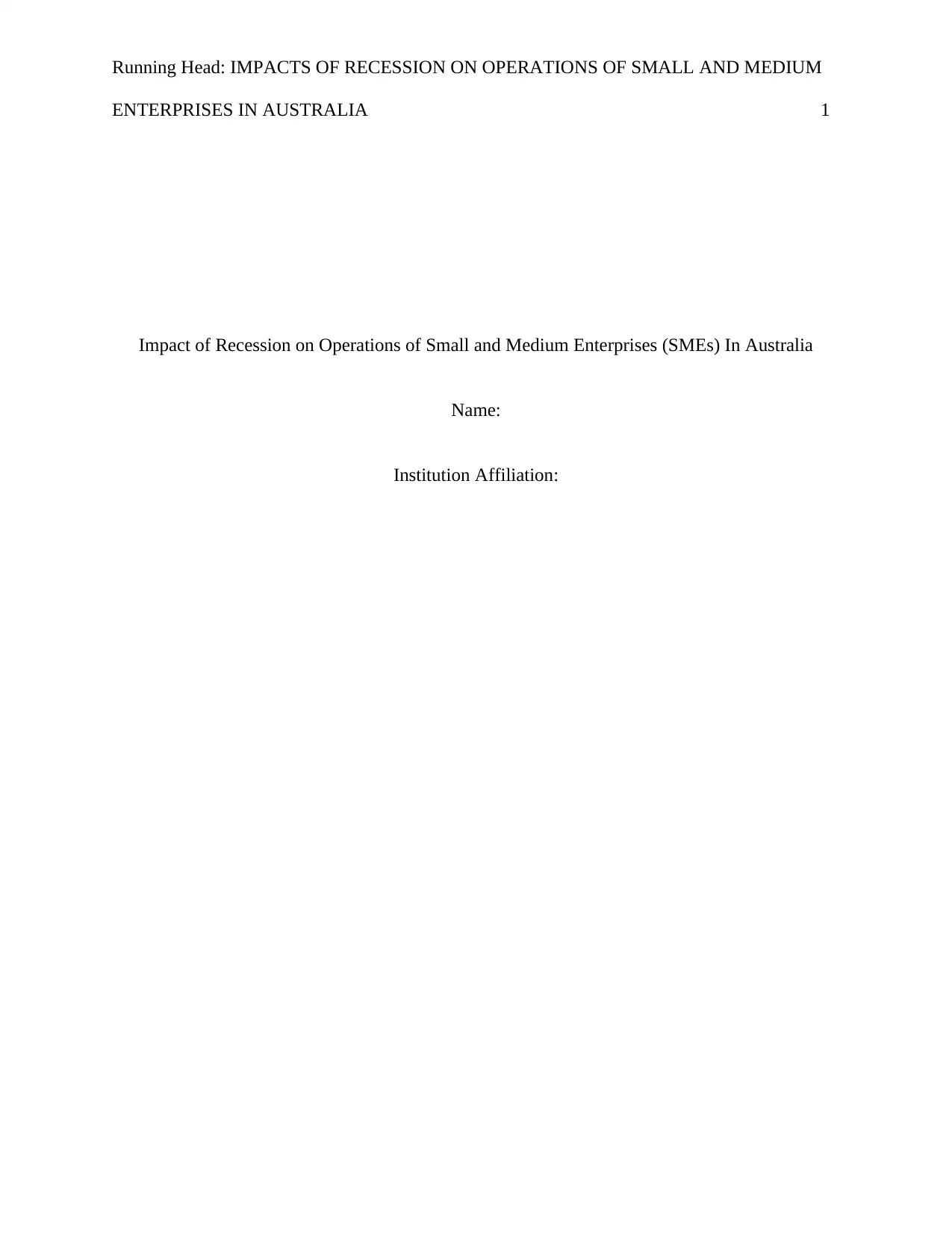
Running Head: IMPACTS OF RECESSION ON OPERATIONS OF SMALL AND MEDIUM
ENTERPRISES IN AUSTRALIA 1
Impact of Recession on Operations of Small and Medium Enterprises (SMEs) In Australia
Name:
Institution Affiliation:
ENTERPRISES IN AUSTRALIA 1
Impact of Recession on Operations of Small and Medium Enterprises (SMEs) In Australia
Name:
Institution Affiliation:
Paraphrase This Document
Need a fresh take? Get an instant paraphrase of this document with our AI Paraphraser
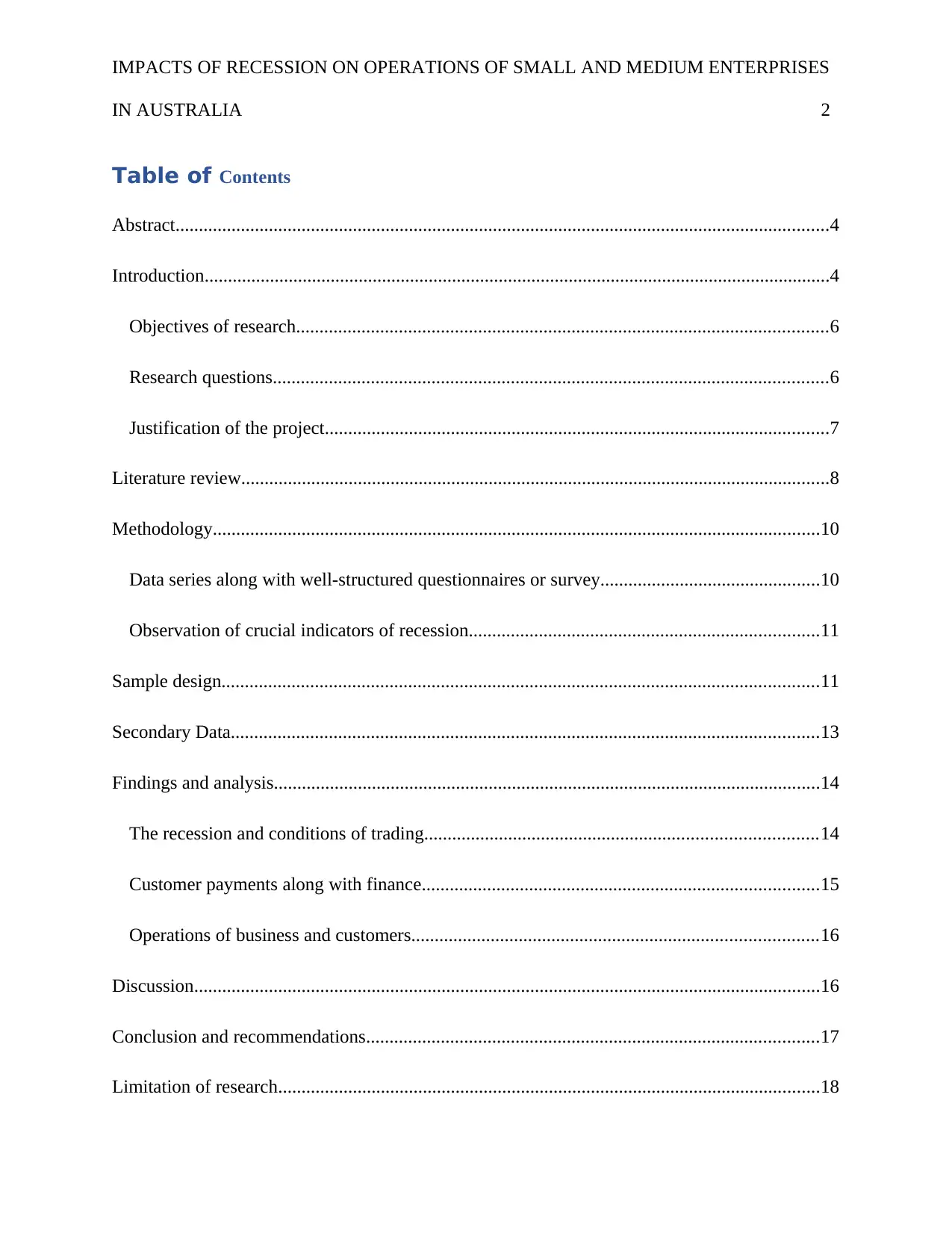
IMPACTS OF RECESSION ON OPERATIONS OF SMALL AND MEDIUM ENTERPRISES
IN AUSTRALIA 2
Table of Contents
Abstract............................................................................................................................................4
Introduction......................................................................................................................................4
Objectives of research..................................................................................................................6
Research questions.......................................................................................................................6
Justification of the project............................................................................................................7
Literature review..............................................................................................................................8
Methodology..................................................................................................................................10
Data series along with well-structured questionnaires or survey...............................................10
Observation of crucial indicators of recession...........................................................................11
Sample design................................................................................................................................11
Secondary Data..............................................................................................................................13
Findings and analysis.....................................................................................................................14
The recession and conditions of trading....................................................................................14
Customer payments along with finance.....................................................................................15
Operations of business and customers.......................................................................................16
Discussion......................................................................................................................................16
Conclusion and recommendations.................................................................................................17
Limitation of research....................................................................................................................18
IN AUSTRALIA 2
Table of Contents
Abstract............................................................................................................................................4
Introduction......................................................................................................................................4
Objectives of research..................................................................................................................6
Research questions.......................................................................................................................6
Justification of the project............................................................................................................7
Literature review..............................................................................................................................8
Methodology..................................................................................................................................10
Data series along with well-structured questionnaires or survey...............................................10
Observation of crucial indicators of recession...........................................................................11
Sample design................................................................................................................................11
Secondary Data..............................................................................................................................13
Findings and analysis.....................................................................................................................14
The recession and conditions of trading....................................................................................14
Customer payments along with finance.....................................................................................15
Operations of business and customers.......................................................................................16
Discussion......................................................................................................................................16
Conclusion and recommendations.................................................................................................17
Limitation of research....................................................................................................................18

IMPACTS OF RECESSION ON OPERATIONS OF SMALL AND MEDIUM ENTERPRISES
IN AUSTRALIA 3
References......................................................................................................................................19
IN AUSTRALIA 3
References......................................................................................................................................19
⊘ This is a preview!⊘
Do you want full access?
Subscribe today to unlock all pages.

Trusted by 1+ million students worldwide
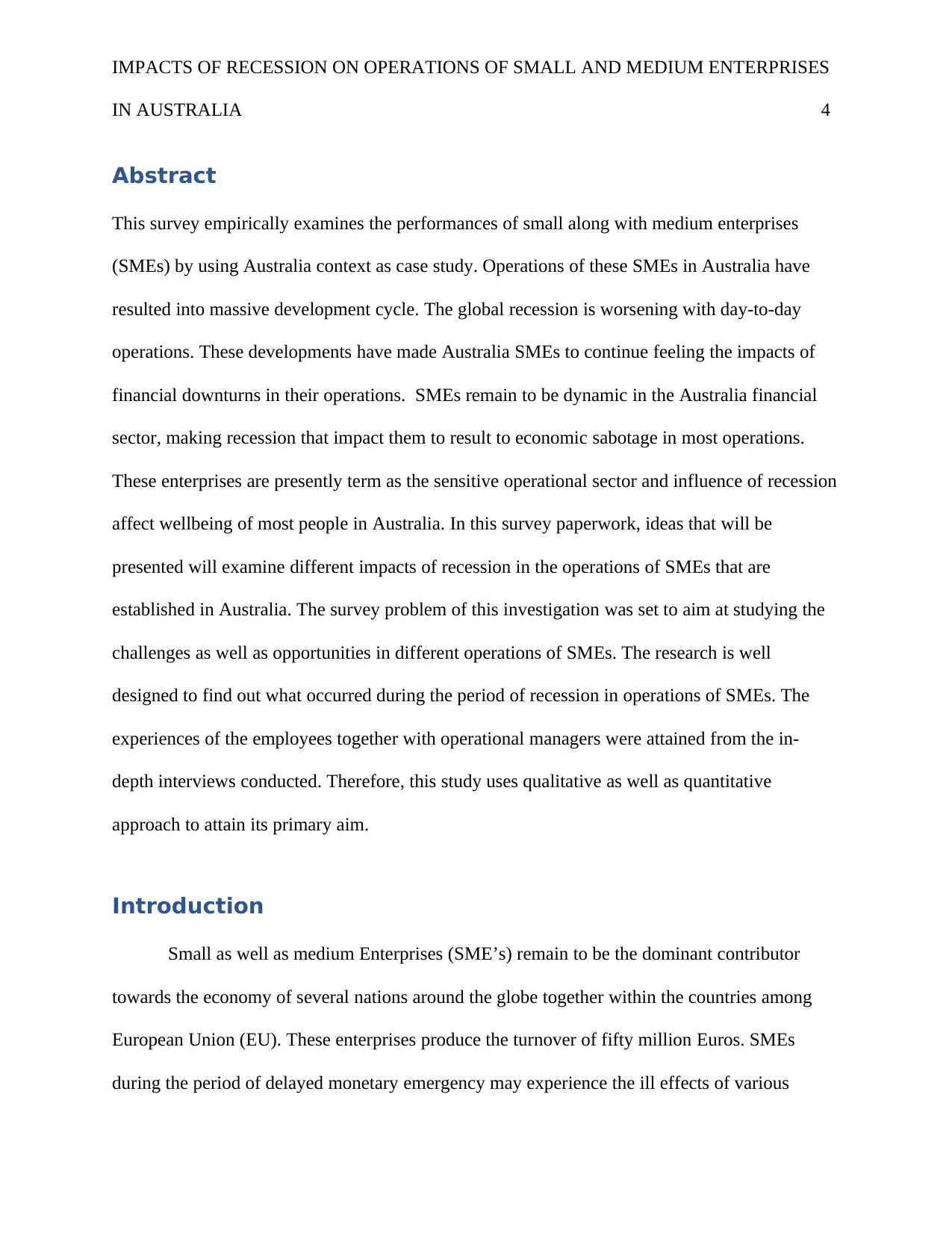
IMPACTS OF RECESSION ON OPERATIONS OF SMALL AND MEDIUM ENTERPRISES
IN AUSTRALIA 4
Abstract
This survey empirically examines the performances of small along with medium enterprises
(SMEs) by using Australia context as case study. Operations of these SMEs in Australia have
resulted into massive development cycle. The global recession is worsening with day-to-day
operations. These developments have made Australia SMEs to continue feeling the impacts of
financial downturns in their operations. SMEs remain to be dynamic in the Australia financial
sector, making recession that impact them to result to economic sabotage in most operations.
These enterprises are presently term as the sensitive operational sector and influence of recession
affect wellbeing of most people in Australia. In this survey paperwork, ideas that will be
presented will examine different impacts of recession in the operations of SMEs that are
established in Australia. The survey problem of this investigation was set to aim at studying the
challenges as well as opportunities in different operations of SMEs. The research is well
designed to find out what occurred during the period of recession in operations of SMEs. The
experiences of the employees together with operational managers were attained from the in-
depth interviews conducted. Therefore, this study uses qualitative as well as quantitative
approach to attain its primary aim.
Introduction
Small as well as medium Enterprises (SME’s) remain to be the dominant contributor
towards the economy of several nations around the globe together within the countries among
European Union (EU). These enterprises produce the turnover of fifty million Euros. SMEs
during the period of delayed monetary emergency may experience the ill effects of various
IN AUSTRALIA 4
Abstract
This survey empirically examines the performances of small along with medium enterprises
(SMEs) by using Australia context as case study. Operations of these SMEs in Australia have
resulted into massive development cycle. The global recession is worsening with day-to-day
operations. These developments have made Australia SMEs to continue feeling the impacts of
financial downturns in their operations. SMEs remain to be dynamic in the Australia financial
sector, making recession that impact them to result to economic sabotage in most operations.
These enterprises are presently term as the sensitive operational sector and influence of recession
affect wellbeing of most people in Australia. In this survey paperwork, ideas that will be
presented will examine different impacts of recession in the operations of SMEs that are
established in Australia. The survey problem of this investigation was set to aim at studying the
challenges as well as opportunities in different operations of SMEs. The research is well
designed to find out what occurred during the period of recession in operations of SMEs. The
experiences of the employees together with operational managers were attained from the in-
depth interviews conducted. Therefore, this study uses qualitative as well as quantitative
approach to attain its primary aim.
Introduction
Small as well as medium Enterprises (SME’s) remain to be the dominant contributor
towards the economy of several nations around the globe together within the countries among
European Union (EU). These enterprises produce the turnover of fifty million Euros. SMEs
during the period of delayed monetary emergency may experience the ill effects of various
Paraphrase This Document
Need a fresh take? Get an instant paraphrase of this document with our AI Paraphraser
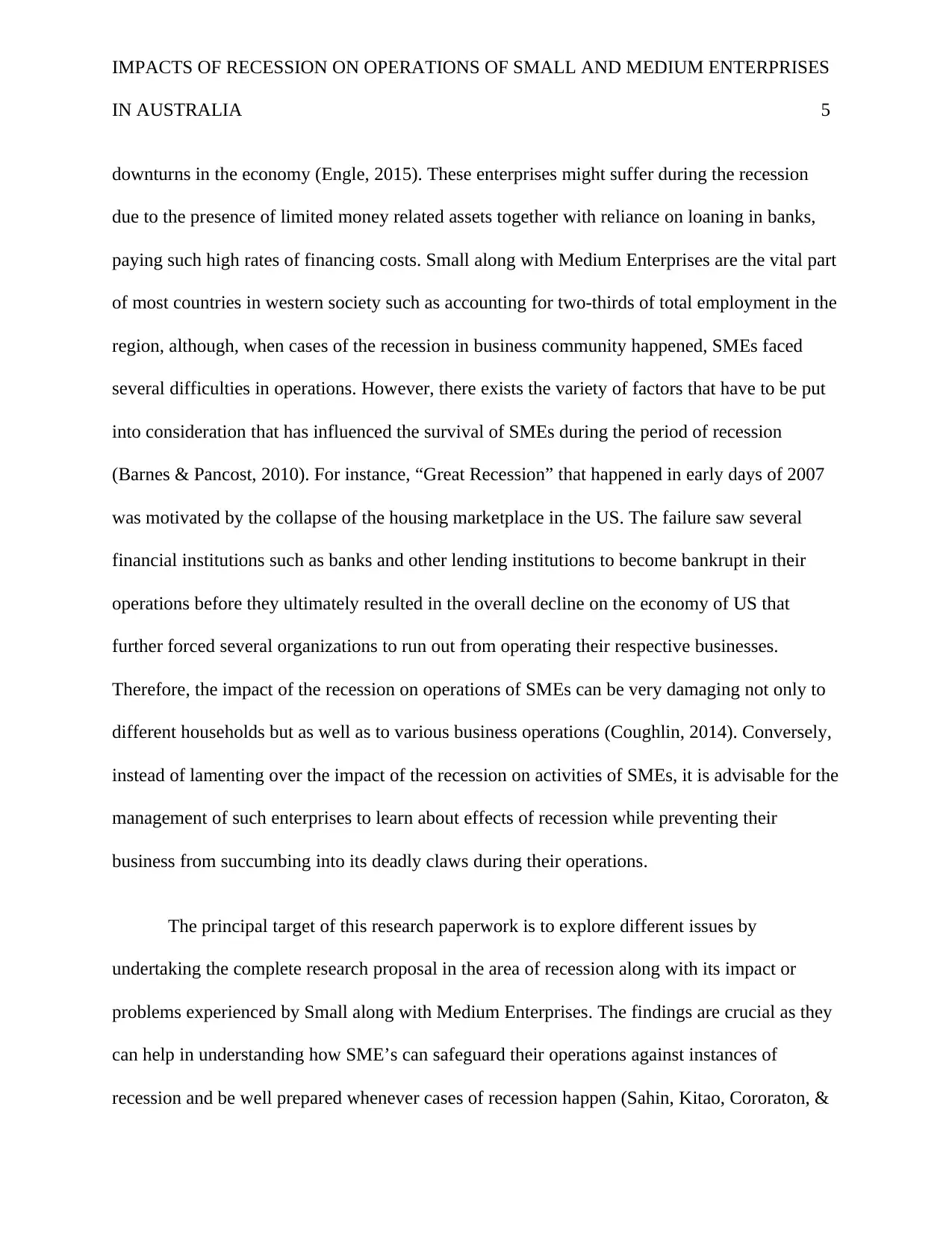
IMPACTS OF RECESSION ON OPERATIONS OF SMALL AND MEDIUM ENTERPRISES
IN AUSTRALIA 5
downturns in the economy (Engle, 2015). These enterprises might suffer during the recession
due to the presence of limited money related assets together with reliance on loaning in banks,
paying such high rates of financing costs. Small along with Medium Enterprises are the vital part
of most countries in western society such as accounting for two-thirds of total employment in the
region, although, when cases of the recession in business community happened, SMEs faced
several difficulties in operations. However, there exists the variety of factors that have to be put
into consideration that has influenced the survival of SMEs during the period of recession
(Barnes & Pancost, 2010). For instance, “Great Recession” that happened in early days of 2007
was motivated by the collapse of the housing marketplace in the US. The failure saw several
financial institutions such as banks and other lending institutions to become bankrupt in their
operations before they ultimately resulted in the overall decline on the economy of US that
further forced several organizations to run out from operating their respective businesses.
Therefore, the impact of the recession on operations of SMEs can be very damaging not only to
different households but as well as to various business operations (Coughlin, 2014). Conversely,
instead of lamenting over the impact of the recession on activities of SMEs, it is advisable for the
management of such enterprises to learn about effects of recession while preventing their
business from succumbing into its deadly claws during their operations.
The principal target of this research paperwork is to explore different issues by
undertaking the complete research proposal in the area of recession along with its impact or
problems experienced by Small along with Medium Enterprises. The findings are crucial as they
can help in understanding how SME’s can safeguard their operations against instances of
recession and be well prepared whenever cases of recession happen (Sahin, Kitao, Cororaton, &
IN AUSTRALIA 5
downturns in the economy (Engle, 2015). These enterprises might suffer during the recession
due to the presence of limited money related assets together with reliance on loaning in banks,
paying such high rates of financing costs. Small along with Medium Enterprises are the vital part
of most countries in western society such as accounting for two-thirds of total employment in the
region, although, when cases of the recession in business community happened, SMEs faced
several difficulties in operations. However, there exists the variety of factors that have to be put
into consideration that has influenced the survival of SMEs during the period of recession
(Barnes & Pancost, 2010). For instance, “Great Recession” that happened in early days of 2007
was motivated by the collapse of the housing marketplace in the US. The failure saw several
financial institutions such as banks and other lending institutions to become bankrupt in their
operations before they ultimately resulted in the overall decline on the economy of US that
further forced several organizations to run out from operating their respective businesses.
Therefore, the impact of the recession on operations of SMEs can be very damaging not only to
different households but as well as to various business operations (Coughlin, 2014). Conversely,
instead of lamenting over the impact of the recession on activities of SMEs, it is advisable for the
management of such enterprises to learn about effects of recession while preventing their
business from succumbing into its deadly claws during their operations.
The principal target of this research paperwork is to explore different issues by
undertaking the complete research proposal in the area of recession along with its impact or
problems experienced by Small along with Medium Enterprises. The findings are crucial as they
can help in understanding how SME’s can safeguard their operations against instances of
recession and be well prepared whenever cases of recession happen (Sahin, Kitao, Cororaton, &
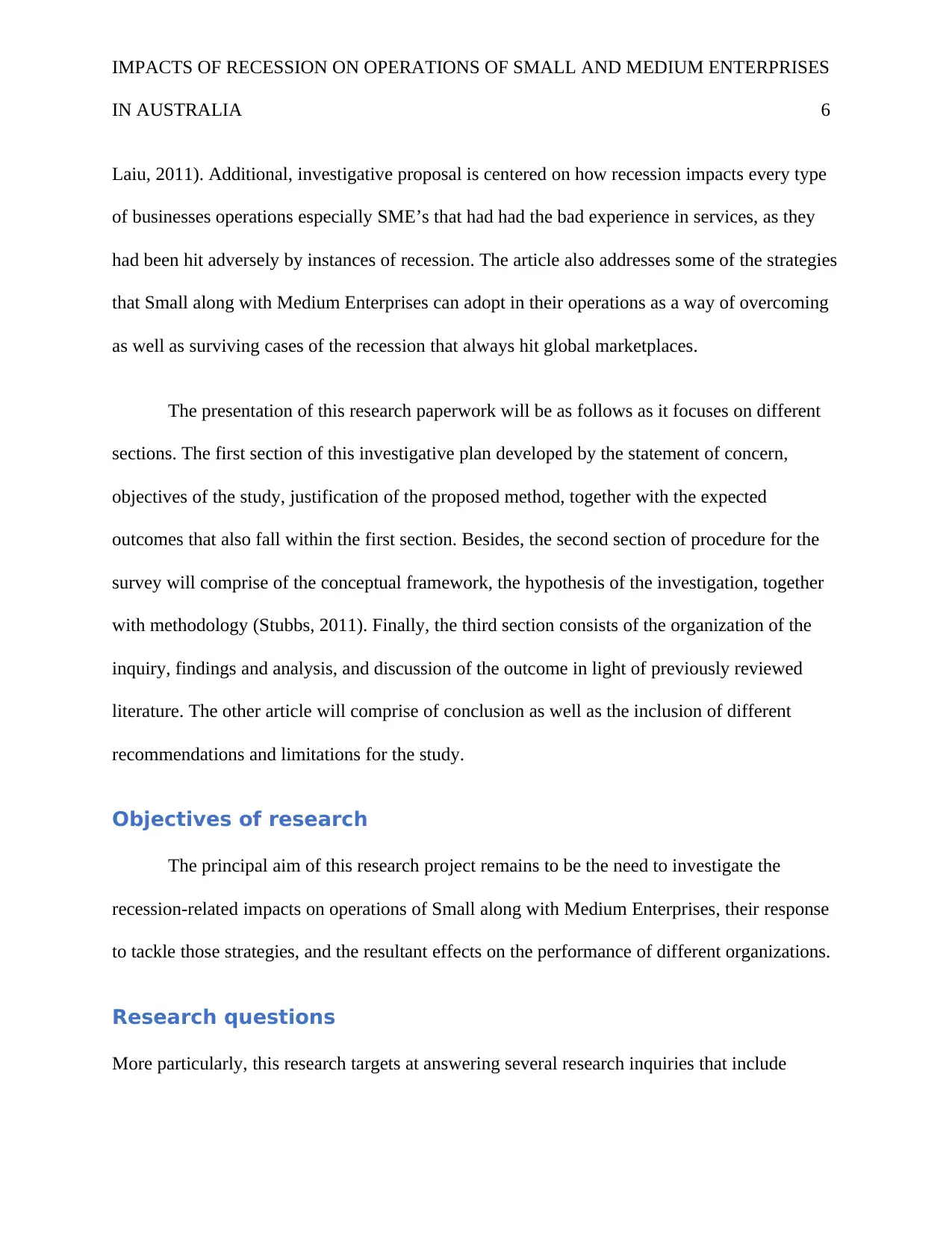
IMPACTS OF RECESSION ON OPERATIONS OF SMALL AND MEDIUM ENTERPRISES
IN AUSTRALIA 6
Laiu, 2011). Additional, investigative proposal is centered on how recession impacts every type
of businesses operations especially SME’s that had had the bad experience in services, as they
had been hit adversely by instances of recession. The article also addresses some of the strategies
that Small along with Medium Enterprises can adopt in their operations as a way of overcoming
as well as surviving cases of the recession that always hit global marketplaces.
The presentation of this research paperwork will be as follows as it focuses on different
sections. The first section of this investigative plan developed by the statement of concern,
objectives of the study, justification of the proposed method, together with the expected
outcomes that also fall within the first section. Besides, the second section of procedure for the
survey will comprise of the conceptual framework, the hypothesis of the investigation, together
with methodology (Stubbs, 2011). Finally, the third section consists of the organization of the
inquiry, findings and analysis, and discussion of the outcome in light of previously reviewed
literature. The other article will comprise of conclusion as well as the inclusion of different
recommendations and limitations for the study.
Objectives of research
The principal aim of this research project remains to be the need to investigate the
recession-related impacts on operations of Small along with Medium Enterprises, their response
to tackle those strategies, and the resultant effects on the performance of different organizations.
Research questions
More particularly, this research targets at answering several research inquiries that include
IN AUSTRALIA 6
Laiu, 2011). Additional, investigative proposal is centered on how recession impacts every type
of businesses operations especially SME’s that had had the bad experience in services, as they
had been hit adversely by instances of recession. The article also addresses some of the strategies
that Small along with Medium Enterprises can adopt in their operations as a way of overcoming
as well as surviving cases of the recession that always hit global marketplaces.
The presentation of this research paperwork will be as follows as it focuses on different
sections. The first section of this investigative plan developed by the statement of concern,
objectives of the study, justification of the proposed method, together with the expected
outcomes that also fall within the first section. Besides, the second section of procedure for the
survey will comprise of the conceptual framework, the hypothesis of the investigation, together
with methodology (Stubbs, 2011). Finally, the third section consists of the organization of the
inquiry, findings and analysis, and discussion of the outcome in light of previously reviewed
literature. The other article will comprise of conclusion as well as the inclusion of different
recommendations and limitations for the study.
Objectives of research
The principal aim of this research project remains to be the need to investigate the
recession-related impacts on operations of Small along with Medium Enterprises, their response
to tackle those strategies, and the resultant effects on the performance of different organizations.
Research questions
More particularly, this research targets at answering several research inquiries that include
⊘ This is a preview!⊘
Do you want full access?
Subscribe today to unlock all pages.

Trusted by 1+ million students worldwide
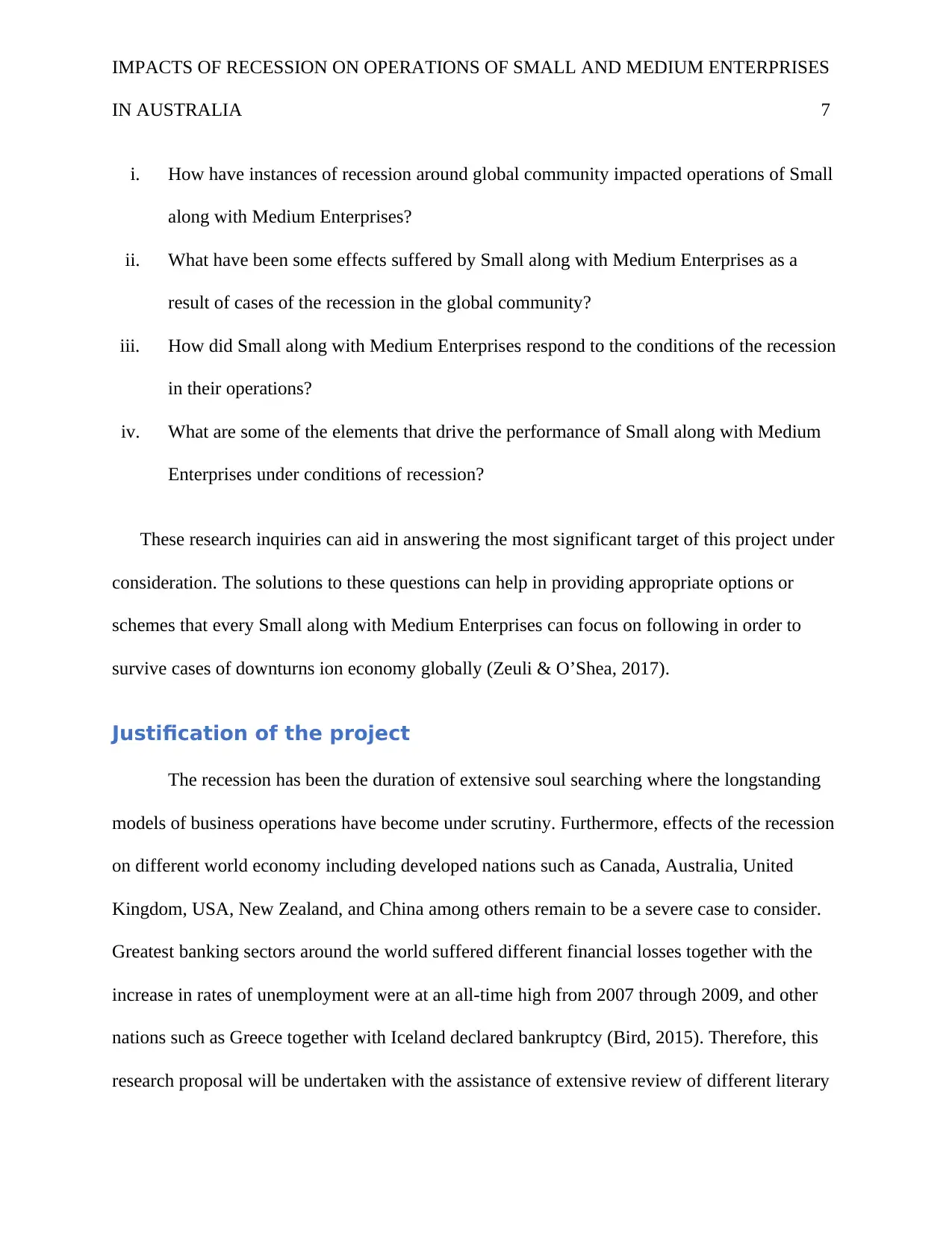
IMPACTS OF RECESSION ON OPERATIONS OF SMALL AND MEDIUM ENTERPRISES
IN AUSTRALIA 7
i. How have instances of recession around global community impacted operations of Small
along with Medium Enterprises?
ii. What have been some effects suffered by Small along with Medium Enterprises as a
result of cases of the recession in the global community?
iii. How did Small along with Medium Enterprises respond to the conditions of the recession
in their operations?
iv. What are some of the elements that drive the performance of Small along with Medium
Enterprises under conditions of recession?
These research inquiries can aid in answering the most significant target of this project under
consideration. The solutions to these questions can help in providing appropriate options or
schemes that every Small along with Medium Enterprises can focus on following in order to
survive cases of downturns ion economy globally (Zeuli & O’Shea, 2017).
Justification of the project
The recession has been the duration of extensive soul searching where the longstanding
models of business operations have become under scrutiny. Furthermore, effects of the recession
on different world economy including developed nations such as Canada, Australia, United
Kingdom, USA, New Zealand, and China among others remain to be a severe case to consider.
Greatest banking sectors around the world suffered different financial losses together with the
increase in rates of unemployment were at an all-time high from 2007 through 2009, and other
nations such as Greece together with Iceland declared bankruptcy (Bird, 2015). Therefore, this
research proposal will be undertaken with the assistance of extensive review of different literary
IN AUSTRALIA 7
i. How have instances of recession around global community impacted operations of Small
along with Medium Enterprises?
ii. What have been some effects suffered by Small along with Medium Enterprises as a
result of cases of the recession in the global community?
iii. How did Small along with Medium Enterprises respond to the conditions of the recession
in their operations?
iv. What are some of the elements that drive the performance of Small along with Medium
Enterprises under conditions of recession?
These research inquiries can aid in answering the most significant target of this project under
consideration. The solutions to these questions can help in providing appropriate options or
schemes that every Small along with Medium Enterprises can focus on following in order to
survive cases of downturns ion economy globally (Zeuli & O’Shea, 2017).
Justification of the project
The recession has been the duration of extensive soul searching where the longstanding
models of business operations have become under scrutiny. Furthermore, effects of the recession
on different world economy including developed nations such as Canada, Australia, United
Kingdom, USA, New Zealand, and China among others remain to be a severe case to consider.
Greatest banking sectors around the world suffered different financial losses together with the
increase in rates of unemployment were at an all-time high from 2007 through 2009, and other
nations such as Greece together with Iceland declared bankruptcy (Bird, 2015). Therefore, this
research proposal will be undertaken with the assistance of extensive review of different literary
Paraphrase This Document
Need a fresh take? Get an instant paraphrase of this document with our AI Paraphraser
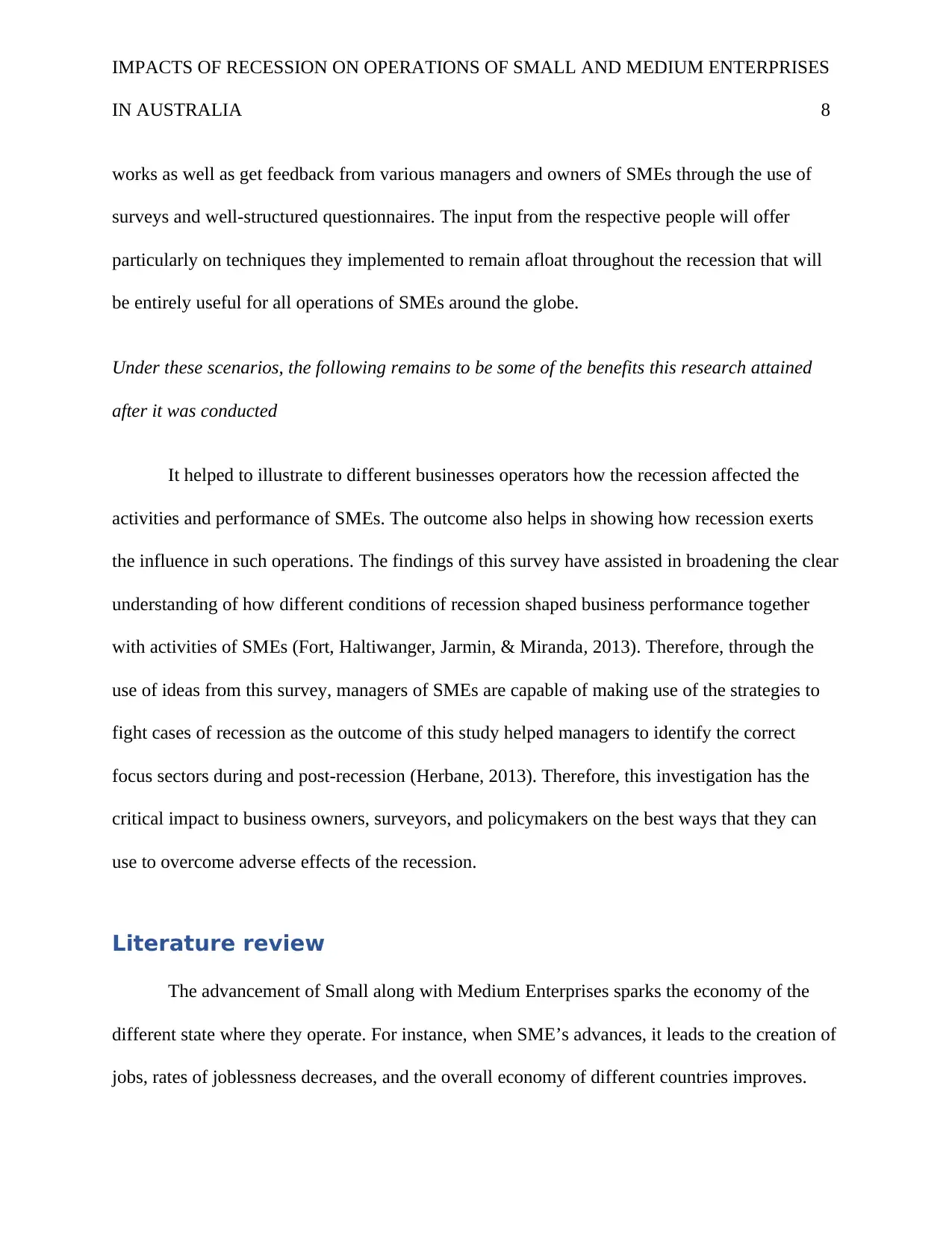
IMPACTS OF RECESSION ON OPERATIONS OF SMALL AND MEDIUM ENTERPRISES
IN AUSTRALIA 8
works as well as get feedback from various managers and owners of SMEs through the use of
surveys and well-structured questionnaires. The input from the respective people will offer
particularly on techniques they implemented to remain afloat throughout the recession that will
be entirely useful for all operations of SMEs around the globe.
Under these scenarios, the following remains to be some of the benefits this research attained
after it was conducted
It helped to illustrate to different businesses operators how the recession affected the
activities and performance of SMEs. The outcome also helps in showing how recession exerts
the influence in such operations. The findings of this survey have assisted in broadening the clear
understanding of how different conditions of recession shaped business performance together
with activities of SMEs (Fort, Haltiwanger, Jarmin, & Miranda, 2013). Therefore, through the
use of ideas from this survey, managers of SMEs are capable of making use of the strategies to
fight cases of recession as the outcome of this study helped managers to identify the correct
focus sectors during and post-recession (Herbane, 2013). Therefore, this investigation has the
critical impact to business owners, surveyors, and policymakers on the best ways that they can
use to overcome adverse effects of the recession.
Literature review
The advancement of Small along with Medium Enterprises sparks the economy of the
different state where they operate. For instance, when SME’s advances, it leads to the creation of
jobs, rates of joblessness decreases, and the overall economy of different countries improves.
IN AUSTRALIA 8
works as well as get feedback from various managers and owners of SMEs through the use of
surveys and well-structured questionnaires. The input from the respective people will offer
particularly on techniques they implemented to remain afloat throughout the recession that will
be entirely useful for all operations of SMEs around the globe.
Under these scenarios, the following remains to be some of the benefits this research attained
after it was conducted
It helped to illustrate to different businesses operators how the recession affected the
activities and performance of SMEs. The outcome also helps in showing how recession exerts
the influence in such operations. The findings of this survey have assisted in broadening the clear
understanding of how different conditions of recession shaped business performance together
with activities of SMEs (Fort, Haltiwanger, Jarmin, & Miranda, 2013). Therefore, through the
use of ideas from this survey, managers of SMEs are capable of making use of the strategies to
fight cases of recession as the outcome of this study helped managers to identify the correct
focus sectors during and post-recession (Herbane, 2013). Therefore, this investigation has the
critical impact to business owners, surveyors, and policymakers on the best ways that they can
use to overcome adverse effects of the recession.
Literature review
The advancement of Small along with Medium Enterprises sparks the economy of the
different state where they operate. For instance, when SME’s advances, it leads to the creation of
jobs, rates of joblessness decreases, and the overall economy of different countries improves.
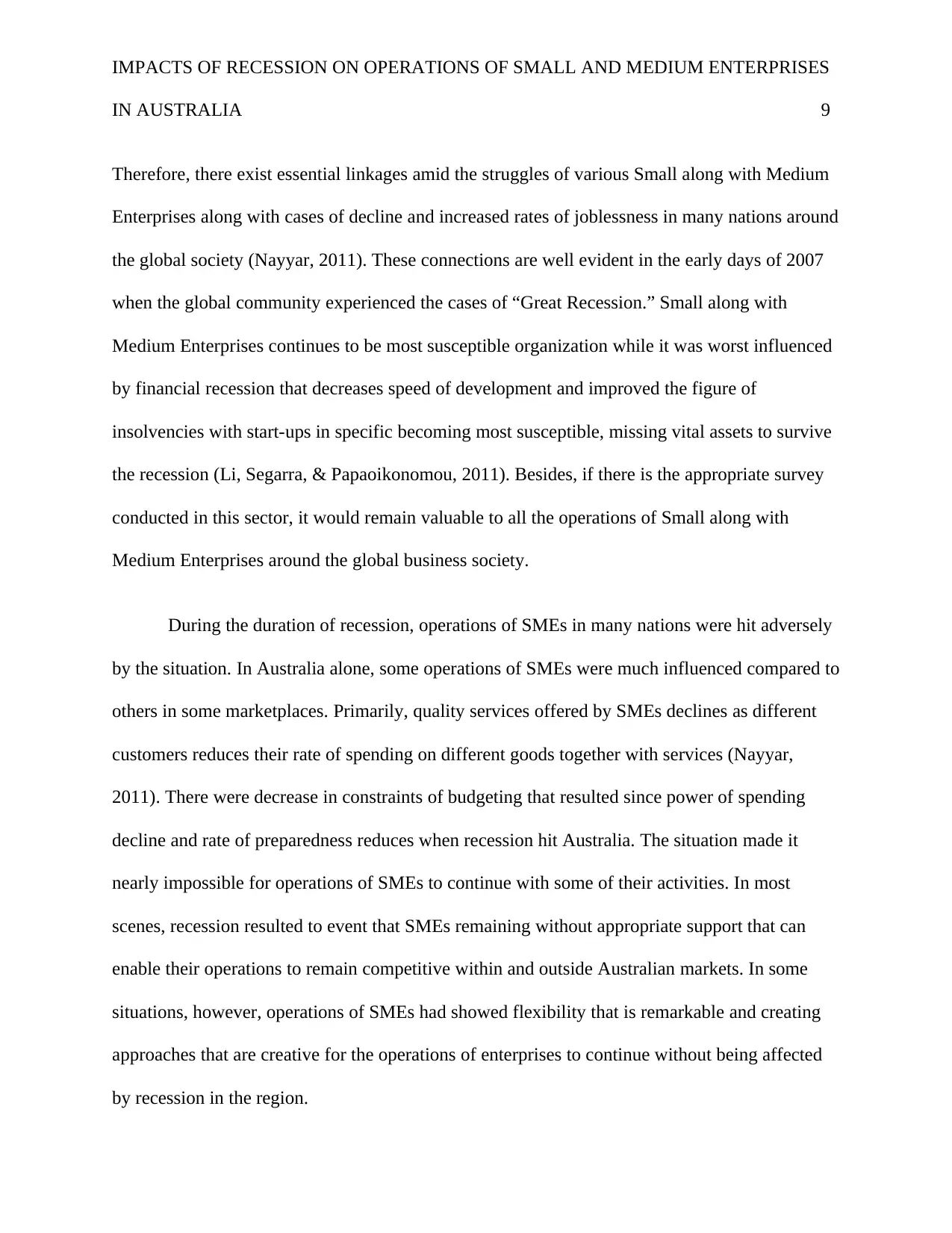
IMPACTS OF RECESSION ON OPERATIONS OF SMALL AND MEDIUM ENTERPRISES
IN AUSTRALIA 9
Therefore, there exist essential linkages amid the struggles of various Small along with Medium
Enterprises along with cases of decline and increased rates of joblessness in many nations around
the global society (Nayyar, 2011). These connections are well evident in the early days of 2007
when the global community experienced the cases of “Great Recession.” Small along with
Medium Enterprises continues to be most susceptible organization while it was worst influenced
by financial recession that decreases speed of development and improved the figure of
insolvencies with start-ups in specific becoming most susceptible, missing vital assets to survive
the recession (Li, Segarra, & Papaoikonomou, 2011). Besides, if there is the appropriate survey
conducted in this sector, it would remain valuable to all the operations of Small along with
Medium Enterprises around the global business society.
During the duration of recession, operations of SMEs in many nations were hit adversely
by the situation. In Australia alone, some operations of SMEs were much influenced compared to
others in some marketplaces. Primarily, quality services offered by SMEs declines as different
customers reduces their rate of spending on different goods together with services (Nayyar,
2011). There were decrease in constraints of budgeting that resulted since power of spending
decline and rate of preparedness reduces when recession hit Australia. The situation made it
nearly impossible for operations of SMEs to continue with some of their activities. In most
scenes, recession resulted to event that SMEs remaining without appropriate support that can
enable their operations to remain competitive within and outside Australian markets. In some
situations, however, operations of SMEs had showed flexibility that is remarkable and creating
approaches that are creative for the operations of enterprises to continue without being affected
by recession in the region.
IN AUSTRALIA 9
Therefore, there exist essential linkages amid the struggles of various Small along with Medium
Enterprises along with cases of decline and increased rates of joblessness in many nations around
the global society (Nayyar, 2011). These connections are well evident in the early days of 2007
when the global community experienced the cases of “Great Recession.” Small along with
Medium Enterprises continues to be most susceptible organization while it was worst influenced
by financial recession that decreases speed of development and improved the figure of
insolvencies with start-ups in specific becoming most susceptible, missing vital assets to survive
the recession (Li, Segarra, & Papaoikonomou, 2011). Besides, if there is the appropriate survey
conducted in this sector, it would remain valuable to all the operations of Small along with
Medium Enterprises around the global business society.
During the duration of recession, operations of SMEs in many nations were hit adversely
by the situation. In Australia alone, some operations of SMEs were much influenced compared to
others in some marketplaces. Primarily, quality services offered by SMEs declines as different
customers reduces their rate of spending on different goods together with services (Nayyar,
2011). There were decrease in constraints of budgeting that resulted since power of spending
decline and rate of preparedness reduces when recession hit Australia. The situation made it
nearly impossible for operations of SMEs to continue with some of their activities. In most
scenes, recession resulted to event that SMEs remaining without appropriate support that can
enable their operations to remain competitive within and outside Australian markets. In some
situations, however, operations of SMEs had showed flexibility that is remarkable and creating
approaches that are creative for the operations of enterprises to continue without being affected
by recession in the region.
⊘ This is a preview!⊘
Do you want full access?
Subscribe today to unlock all pages.

Trusted by 1+ million students worldwide
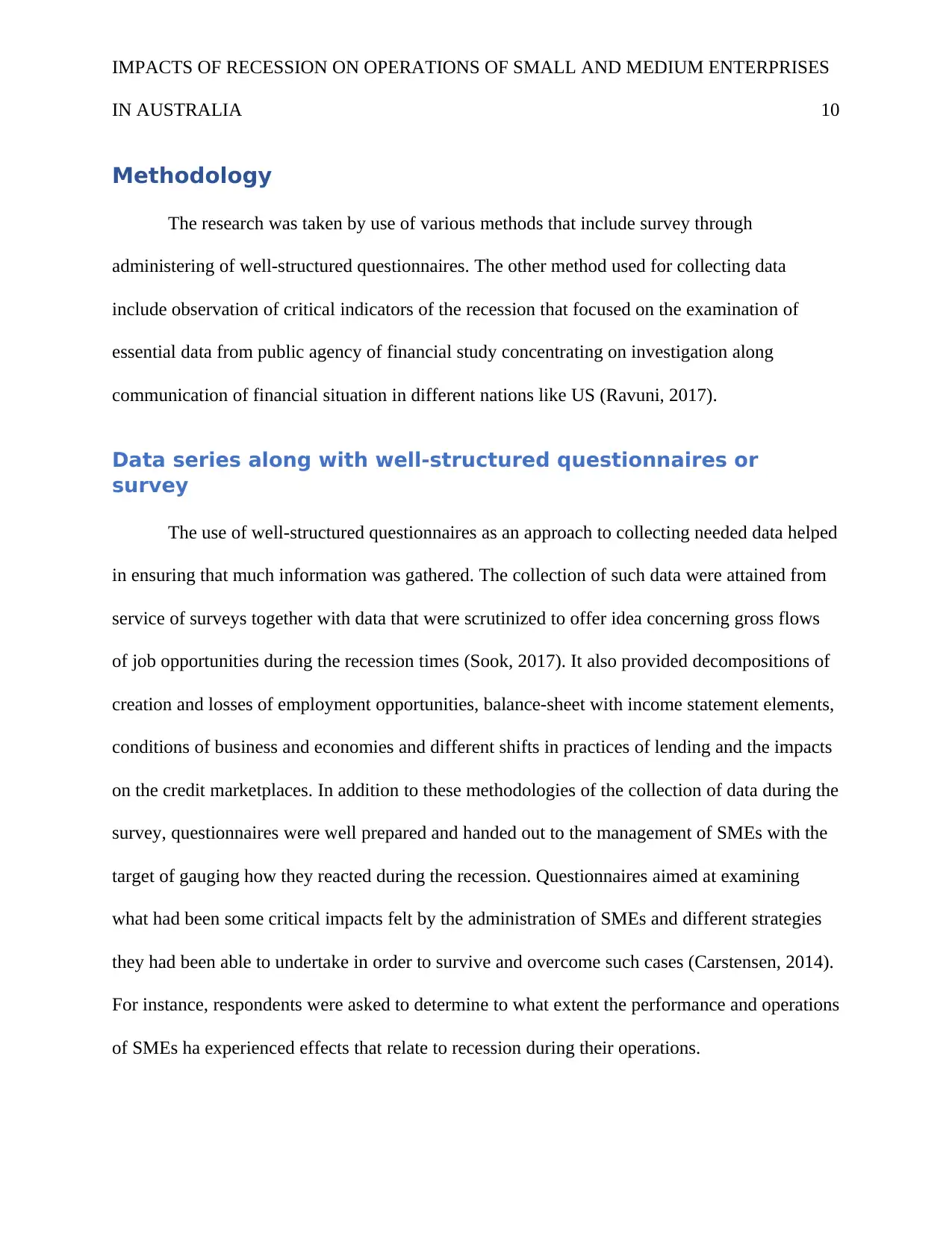
IMPACTS OF RECESSION ON OPERATIONS OF SMALL AND MEDIUM ENTERPRISES
IN AUSTRALIA 10
Methodology
The research was taken by use of various methods that include survey through
administering of well-structured questionnaires. The other method used for collecting data
include observation of critical indicators of the recession that focused on the examination of
essential data from public agency of financial study concentrating on investigation along
communication of financial situation in different nations like US (Ravuni, 2017).
Data series along with well-structured questionnaires or
survey
The use of well-structured questionnaires as an approach to collecting needed data helped
in ensuring that much information was gathered. The collection of such data were attained from
service of surveys together with data that were scrutinized to offer idea concerning gross flows
of job opportunities during the recession times (Sook, 2017). It also provided decompositions of
creation and losses of employment opportunities, balance-sheet with income statement elements,
conditions of business and economies and different shifts in practices of lending and the impacts
on the credit marketplaces. In addition to these methodologies of the collection of data during the
survey, questionnaires were well prepared and handed out to the management of SMEs with the
target of gauging how they reacted during the recession. Questionnaires aimed at examining
what had been some critical impacts felt by the administration of SMEs and different strategies
they had been able to undertake in order to survive and overcome such cases (Carstensen, 2014).
For instance, respondents were asked to determine to what extent the performance and operations
of SMEs ha experienced effects that relate to recession during their operations.
IN AUSTRALIA 10
Methodology
The research was taken by use of various methods that include survey through
administering of well-structured questionnaires. The other method used for collecting data
include observation of critical indicators of the recession that focused on the examination of
essential data from public agency of financial study concentrating on investigation along
communication of financial situation in different nations like US (Ravuni, 2017).
Data series along with well-structured questionnaires or
survey
The use of well-structured questionnaires as an approach to collecting needed data helped
in ensuring that much information was gathered. The collection of such data were attained from
service of surveys together with data that were scrutinized to offer idea concerning gross flows
of job opportunities during the recession times (Sook, 2017). It also provided decompositions of
creation and losses of employment opportunities, balance-sheet with income statement elements,
conditions of business and economies and different shifts in practices of lending and the impacts
on the credit marketplaces. In addition to these methodologies of the collection of data during the
survey, questionnaires were well prepared and handed out to the management of SMEs with the
target of gauging how they reacted during the recession. Questionnaires aimed at examining
what had been some critical impacts felt by the administration of SMEs and different strategies
they had been able to undertake in order to survive and overcome such cases (Carstensen, 2014).
For instance, respondents were asked to determine to what extent the performance and operations
of SMEs ha experienced effects that relate to recession during their operations.
Paraphrase This Document
Need a fresh take? Get an instant paraphrase of this document with our AI Paraphraser
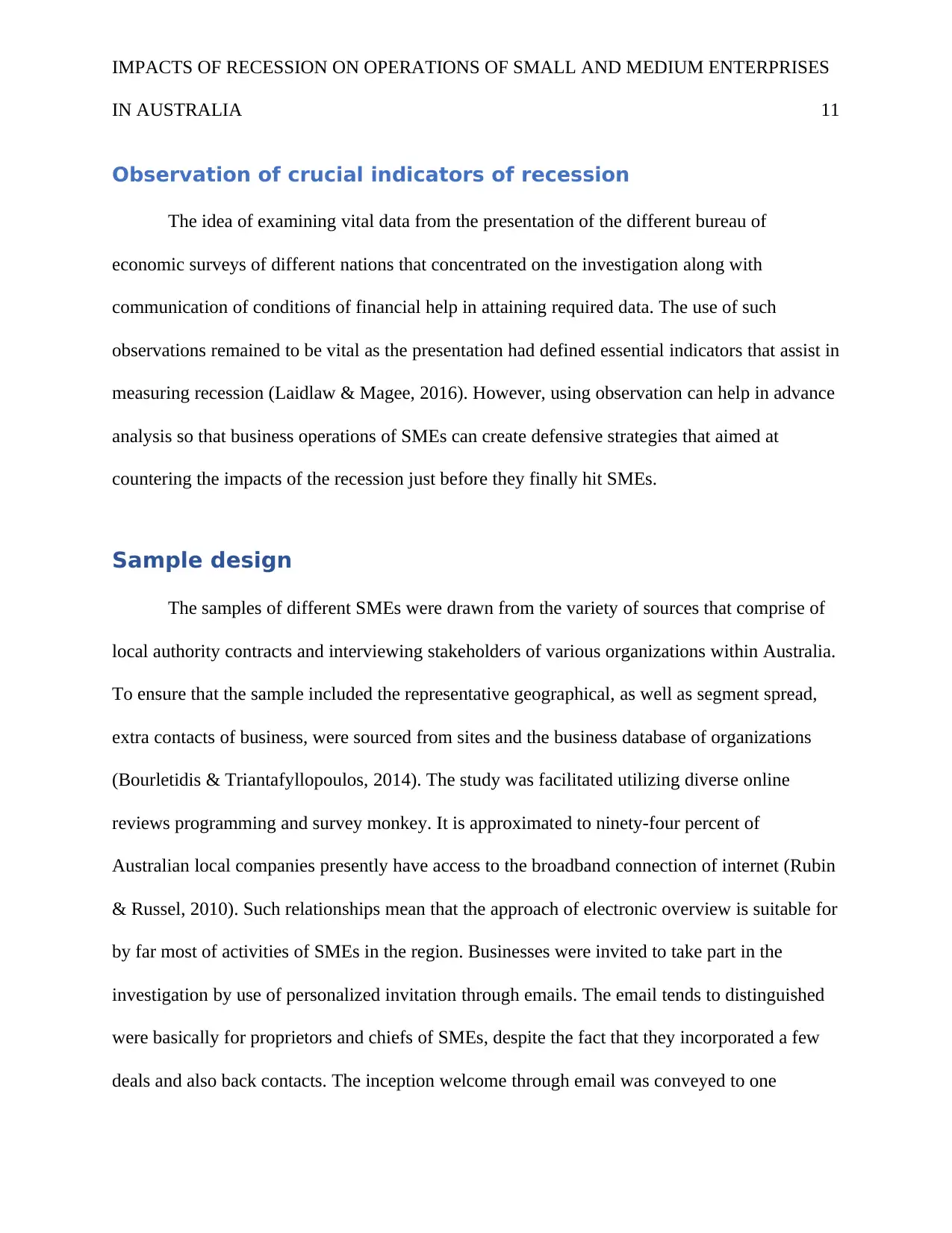
IMPACTS OF RECESSION ON OPERATIONS OF SMALL AND MEDIUM ENTERPRISES
IN AUSTRALIA 11
Observation of crucial indicators of recession
The idea of examining vital data from the presentation of the different bureau of
economic surveys of different nations that concentrated on the investigation along with
communication of conditions of financial help in attaining required data. The use of such
observations remained to be vital as the presentation had defined essential indicators that assist in
measuring recession (Laidlaw & Magee, 2016). However, using observation can help in advance
analysis so that business operations of SMEs can create defensive strategies that aimed at
countering the impacts of the recession just before they finally hit SMEs.
Sample design
The samples of different SMEs were drawn from the variety of sources that comprise of
local authority contracts and interviewing stakeholders of various organizations within Australia.
To ensure that the sample included the representative geographical, as well as segment spread,
extra contacts of business, were sourced from sites and the business database of organizations
(Bourletidis & Triantafyllopoulos, 2014). The study was facilitated utilizing diverse online
reviews programming and survey monkey. It is approximated to ninety-four percent of
Australian local companies presently have access to the broadband connection of internet (Rubin
& Russel, 2010). Such relationships mean that the approach of electronic overview is suitable for
by far most of activities of SMEs in the region. Businesses were invited to take part in the
investigation by use of personalized invitation through emails. The email tends to distinguished
were basically for proprietors and chiefs of SMEs, despite the fact that they incorporated a few
deals and also back contacts. The inception welcome through email was conveyed to one
IN AUSTRALIA 11
Observation of crucial indicators of recession
The idea of examining vital data from the presentation of the different bureau of
economic surveys of different nations that concentrated on the investigation along with
communication of conditions of financial help in attaining required data. The use of such
observations remained to be vital as the presentation had defined essential indicators that assist in
measuring recession (Laidlaw & Magee, 2016). However, using observation can help in advance
analysis so that business operations of SMEs can create defensive strategies that aimed at
countering the impacts of the recession just before they finally hit SMEs.
Sample design
The samples of different SMEs were drawn from the variety of sources that comprise of
local authority contracts and interviewing stakeholders of various organizations within Australia.
To ensure that the sample included the representative geographical, as well as segment spread,
extra contacts of business, were sourced from sites and the business database of organizations
(Bourletidis & Triantafyllopoulos, 2014). The study was facilitated utilizing diverse online
reviews programming and survey monkey. It is approximated to ninety-four percent of
Australian local companies presently have access to the broadband connection of internet (Rubin
& Russel, 2010). Such relationships mean that the approach of electronic overview is suitable for
by far most of activities of SMEs in the region. Businesses were invited to take part in the
investigation by use of personalized invitation through emails. The email tends to distinguished
were basically for proprietors and chiefs of SMEs, despite the fact that they incorporated a few
deals and also back contacts. The inception welcome through email was conveyed to one
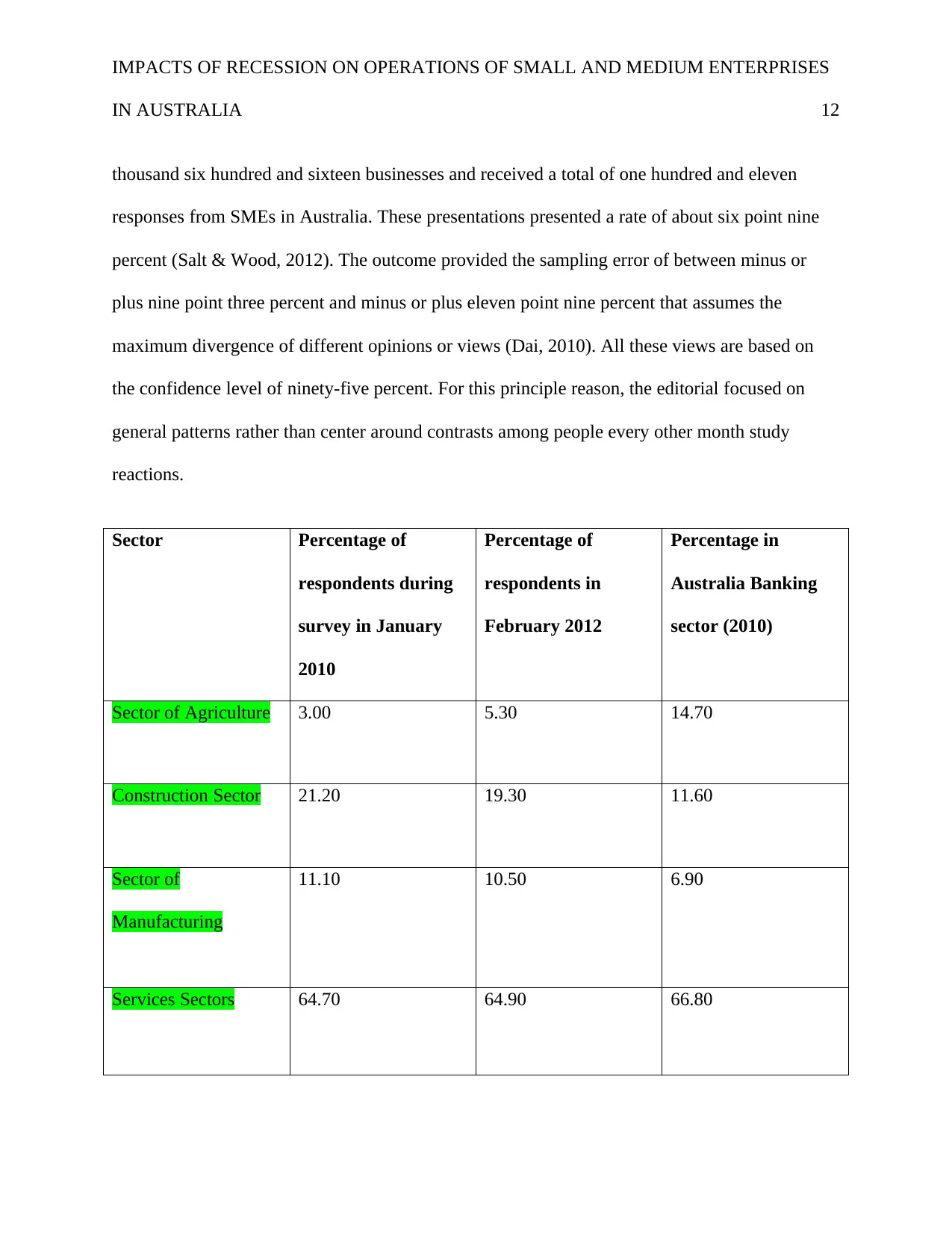
IMPACTS OF RECESSION ON OPERATIONS OF SMALL AND MEDIUM ENTERPRISES
IN AUSTRALIA 12
thousand six hundred and sixteen businesses and received a total of one hundred and eleven
responses from SMEs in Australia. These presentations presented a rate of about six point nine
percent (Salt & Wood, 2012). The outcome provided the sampling error of between minus or
plus nine point three percent and minus or plus eleven point nine percent that assumes the
maximum divergence of different opinions or views (Dai, 2010). All these views are based on
the confidence level of ninety-five percent. For this principle reason, the editorial focused on
general patterns rather than center around contrasts among people every other month study
reactions.
Sector Percentage of
respondents during
survey in January
2010
Percentage of
respondents in
February 2012
Percentage in
Australia Banking
sector (2010)
Sector of Agriculture 3.00 5.30 14.70
Construction Sector 21.20 19.30 11.60
Sector of
Manufacturing
11.10 10.50 6.90
Services Sectors 64.70 64.90 66.80
IN AUSTRALIA 12
thousand six hundred and sixteen businesses and received a total of one hundred and eleven
responses from SMEs in Australia. These presentations presented a rate of about six point nine
percent (Salt & Wood, 2012). The outcome provided the sampling error of between minus or
plus nine point three percent and minus or plus eleven point nine percent that assumes the
maximum divergence of different opinions or views (Dai, 2010). All these views are based on
the confidence level of ninety-five percent. For this principle reason, the editorial focused on
general patterns rather than center around contrasts among people every other month study
reactions.
Sector Percentage of
respondents during
survey in January
2010
Percentage of
respondents in
February 2012
Percentage in
Australia Banking
sector (2010)
Sector of Agriculture 3.00 5.30 14.70
Construction Sector 21.20 19.30 11.60
Sector of
Manufacturing
11.10 10.50 6.90
Services Sectors 64.70 64.90 66.80
⊘ This is a preview!⊘
Do you want full access?
Subscribe today to unlock all pages.

Trusted by 1+ million students worldwide
1 out of 22
Related Documents
Your All-in-One AI-Powered Toolkit for Academic Success.
+13062052269
info@desklib.com
Available 24*7 on WhatsApp / Email
![[object Object]](/_next/static/media/star-bottom.7253800d.svg)
Unlock your academic potential
Copyright © 2020–2026 A2Z Services. All Rights Reserved. Developed and managed by ZUCOL.





